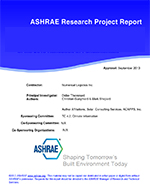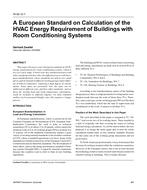A solar energy system is a group of interacting pieces of equipment designed to collect solarradiation, store the collected energy in one form or another, and distribute the energy asneeded for some specific purpose. The performance of all solar energy systems is dependent uponweather. In a solar heating/cooling system, for example, both the energy collected and theenergy demand are functions of the solar radiation, the ambient temperature, and other meteorologicalvariables. These forcing functions are unique in that they are neither completely random, nor deterministic; they are best described as irregular functions of time, both on a small (e.g. hourly or daily) and large (e.g. seasonally or yearly) time scale.
It is this irregular behavior of the forcing functions which complicates the analyses of solar energy systems.
A transient simulation formulated from component models requires a simultaneous solution of a system of algebraic and differential equations which describe the component models. Solar energy systems in particular often exhibit several recycles in the information flow among component models; thus an iterative scheme (in addition to that which may be used to solve the differential equations of the system) is needed to obtain a simultaneous solution of these equations. This paper describes TRNSYS, a computer program designed specifically to connect component models in a specified manner, solve the simultaneous equations of the system model, and display the results.
Citation: Symposium, ASHRAE Transactions, Volume 82, Part 1, Dallas, TX
Product Details
- Published:
- 1976
- Number of Pages:
- 11
- File Size:
- 1 file , 660 KB
- Product Code(s):
- D-DA-76-09-1


